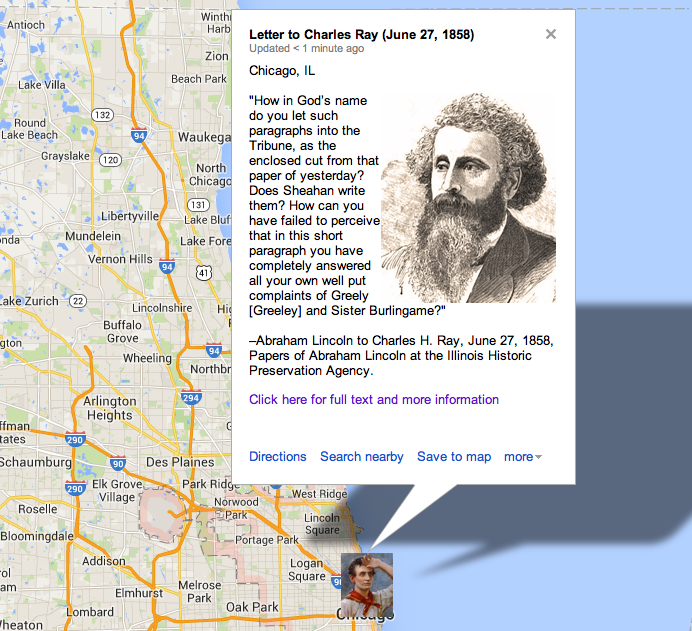Contributing Editors for this page include Jim Coe
Ranking
#37 on the list of 150 Most Teachable Lincoln Documents
Annotated Transcript
Audio Version
On This Date
HD Daily Report, June 27, 1858
The Lincoln Log, June 27, 1858
Close Readings
Custom Map
How Historians Interpret
“A recently discovered Lincoln letter from early in the 1858 campaign shows his partisan teeth bared even more sharply. ‘How in God’s name do you let such paragraph into the Tribune,’ he wrote to Charles H. Ray, complaining about an article from the previous day’s Chicago Tribune. ‘Does Sheahan write them?’ he added, sarcastically referring to James Sheahan, the Democratic editor of the Chicago Times. Continuing the assault and the gratuitous insults, Lincoln then asked, ‘How can you have failed to perceive that in this short paragraph you have completely answered all your own well put complains of [Horace] Greely [sic] and Sister Burlingame?’ The slur against Massachusetts congressman Anson Burlingame’s manhood might actually qualify this particular letter as the fiercest in the Lincoln partisan canon.”
—Matthew Pinsker, “Lincoln and the Lessons of Party Leadership” in Lincoln and Liberty: Wisdom for the Ages, ed. Lucas E. Morel (Lexington: University Press of Kentucky, 2014), 199.
“Through authoritative communications like these, Lincoln had by July strong-armed the Republican press into full conformity and allegiance, at least in Illinois. Independent-minded, out-of-state renegades like Greely, primarily eager to injure the Buchanan administration by encouraging dissident Democrats like Douglas, proved harder to tame. Their unpredictable behavior convinced stalwart David Davis that the Republican Party remained merely ‘confederated,’ not ‘consolidated,’ and unless brought into line would be powerless to battle ‘the infernal South, that prolific monster of ruin, niggers, and disunion.’ Bring the statewide party and press into line Lincoln did. Now it was time to take the Senate battle to the people.”
—Harold Holzer, Lincoln and the Power of the Press (New York: Simon and Schuster, 2015), 174-175.
NOTE TO READERS
This page is under construction and will be developed further by students in the new “Understanding Lincoln” online course sponsored by the House Divided Project at Dickinson College and the Gilder Lehrman Institute of American History. To find out more about the course and to see some of our videotaped class sessions, including virtual field trips to Ford’s Theatre and Gettysburg, please visit our Livestream page at http://new.livestream.com/gilderlehrman/lincoln
Searchable Text
My dear Sir,
How in God’s name do you let such paragraphs into the Tribune, as the enclosed cut from that paper of yesterday? Does Sheahan write them? How can you have failed to perceive that in this short paragraph you have completely answered all your own well put complaints of Greely [Greeley] and Sister Burlingame? What right have you to interfere in Indiana, more than they in Illinois? And what possible argument can be made why all Republicans shall stand out of Hon. John G. Davis’s way in his district in Indiana that can not be made why all Republicans in Illinois shall stand out of Hon. S.A. Douglas’s way? The part in larger type is plainly editorial, and your editorial at that, as you do not credit it to any other paper. I confess it astonishes me.
Yours truly, A. Lincoln.

